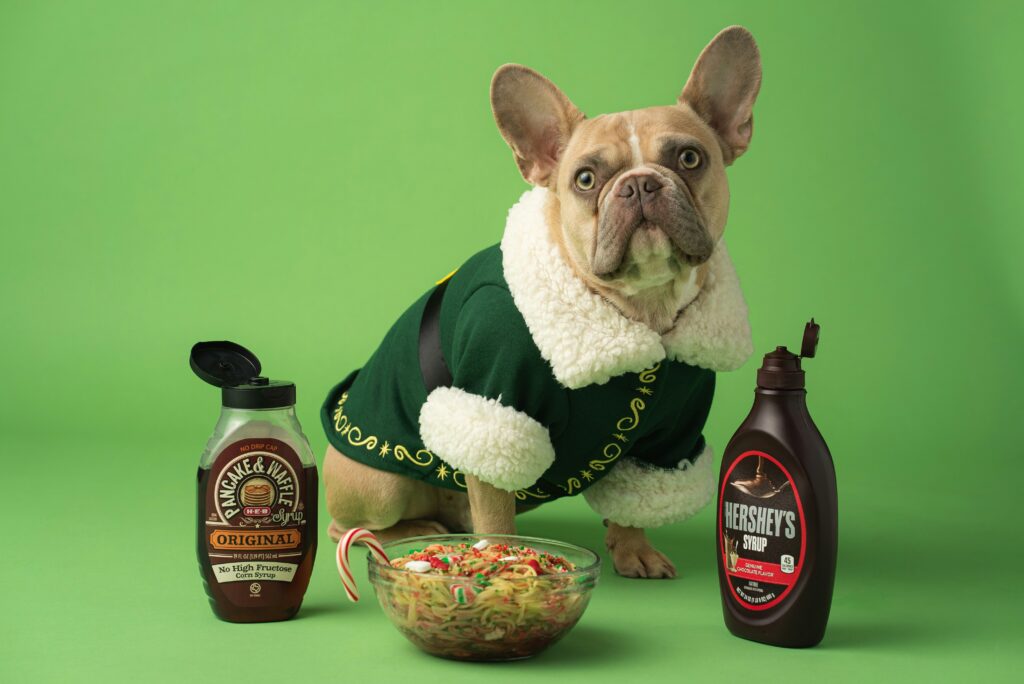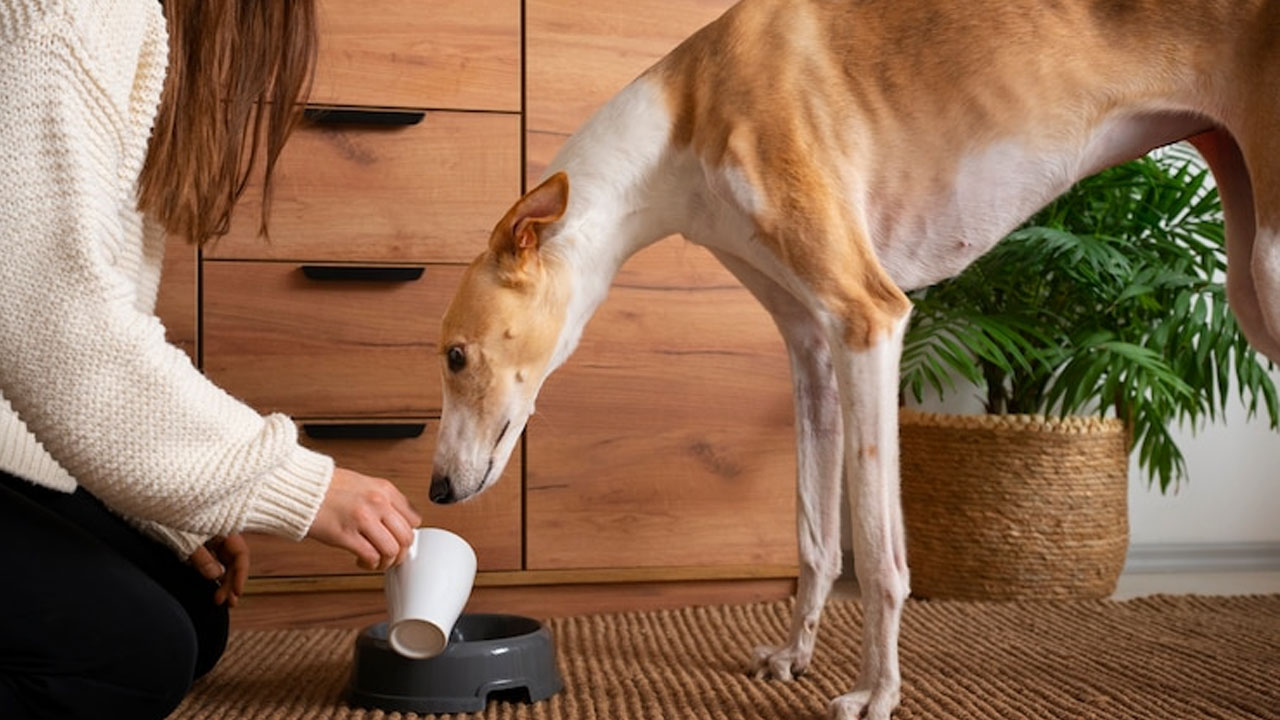The indispensable manual for comprehending the nuances of dogs consuming cat food. Find out the dangers connected to this habit and how to protect the health of your dog. We explore the subtleties of why feeding dogs cat food might not be appropriate, from the possibility of weight gain to digestive problems. With our extensive insights, you can stay informed and make sure your pet is doing well.
Can Dog Eat Cat Food?
A bite of cat food won’t harm your dog, but feeding cat food to dogs regularly is not recommended. The nutrient profiles of cat foods and dog foods are different; cat food has higher protein content and essential amino acids like taurine, necessary for cats but not for dogs. Regular diet consumption of cat food can lead to weight gain and health issues like digestive upset and pancreatitis in dogs.
Additionally, cat food’s fat content is higher, which can cause gastrointestinal issues in dogs with sensitive stomachs. To ensure your dog gets a balanced diet that meets its dietary requirements, stick to high-quality dog food. Always consult a veterinarian for advice on the appropriate food for your dog’s nutritional needs.
While an occasional treat might be fine, long-term feeding of cat food can result in nutrient deficiencies and liver disease in healthy adult dogs. Instead, offer a varied diet with both animal-based proteins and plant-based foods suited for dogs.
What’s the Difference Between Dog Food and Cat Food?
The primary distinction lies in their nutritional requirements. Cat food is formulated with higher levels of protein content and essential amino acids like taurine and arachidonic acid, which are crucial for cats but not for dogs. Feeding cat food to dogs regularly can lead to digestive issues, weight gain, and even liver disease in dogs.
Cat foods generally have higher fat content, which can cause gastrointestinal issues in dogs with sensitive stomachs. Commercial dog food, whether dry dog food or wet food, is designed to meet the varied diet needs of dogs, providing a balanced diet with the right balance of nutrients.
While an occasional bite of cat food may not be harmful, long-term feeding of cat food can disrupt the nutrient profiles necessary for healthy adult dogs. For a proper diet, always offer high-quality dog food and consult a veterinarian for advice to ensure your pet’s dietary requirements are met.
Is It Safe for a Dog to Eat Cat Food?
A bite of cat food may not harm your dog, but feeding it regularly can lead to health issues. Cat foods are formulated to meet the nutritional requirements of cats, with higher protein content and essential amino acids like taurine, which are not necessary for dogs. 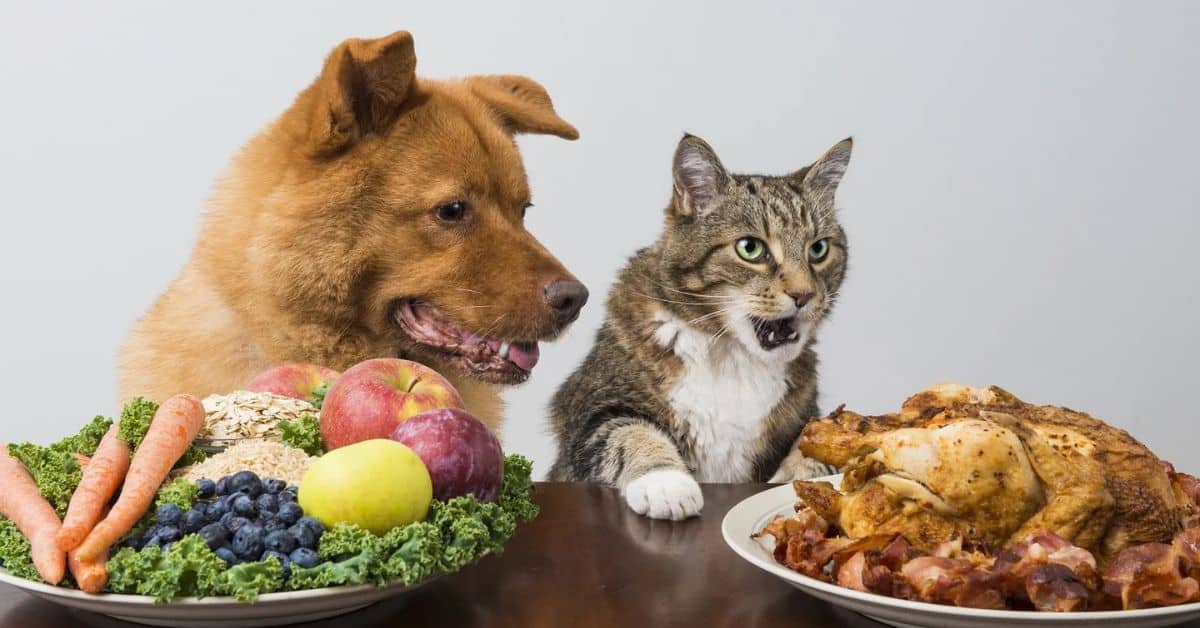
Regular consumption can result in weight gain and digestive issues due to the higher fat content in cat foods. For dogs with a sensitive stomach, eating cat food can cause digestive upset and other gastrointestinal issues. Commercial cat foods are not balanced for a dog’s dietary needs and can lead to deficiencies in essential nutrients over time.
It’s important to maintain a balanced diet tailored to your dog’s specific needs, using high-quality dog food. If your dog frequently accesses the cat food bowl, consider using pet gates or feeding your pets separately. Always consult a veterinarian for advice on your pet’s dietary requirements to ensure they remain healthy and happy.
What can happen to dogs that eat too much cat food?
Consuming excessive cat food can lead to various health issues in dogs. The high-fat content in cat foods can cause weight gain and digestive issues such as an upset stomach and gastrointestinal distress. Over time, the imbalance of nutrients and higher levels of essential amino acids like taurine, designed for cats, can harm dogs.
Dogs with sensitive stomachs may experience frequent digestive upset, while those consuming cat food regularly may develop more severe conditions like pancreatitis or liver disease. Additionally, cat food lacks the balanced diet and varied nutrients required to meet a dog’s dietary requirements, leading to nutrient deficiencies.
It’s crucial to ensure dogs have access to high-quality dog food that meets their specific nutritional needs. Using pet gates or feeding pets separately can help prevent dogs from accessing the cat food bowl. For dietary advice tailored to your dog’s needs, always consult a veterinarian.
How can I stop my dog from eating cat food?
There are several strategies to prevent your dog from accessing cat food. One effective method is to place the cat food bowl on a cat tree or elevated surface, out of the dog’s reach. You can also use pet gates or baby gates to create a separate feeding area for your cat.
Feeding your pets at different times can help, ensuring your dog doesn’t have access to the cat’s food bowl. Providing your dog with high-quality dog food that meets its nutritional requirements will reduce the temptation to eat cat food. Regularly monitoring feeding areas and keeping bags of food securely stored can also prevent accidental snacking.
Be mindful of your dog’s diet and consult a veterinarian for advice on maintaining a balanced diet. Overconsumption of cat food can lead to weight gain, digestive issues, and other health problems due to the higher fat content and different nutrient profiles in cat foods. Keeping the two diets separate is essential for the health and well-being of both your pets.
Is cat food bad for dogs?
Yes, cat food can be harmful to dogs if consumed regularly. While an occasional nibble may not cause immediate harm, feeding cat food to dogs regularly can lead to health issues. Cat foods are formulated to meet the specific nutritional needs of cats, with higher levels of protein and essential amino acids like taurine, which are not necessary for dogs.
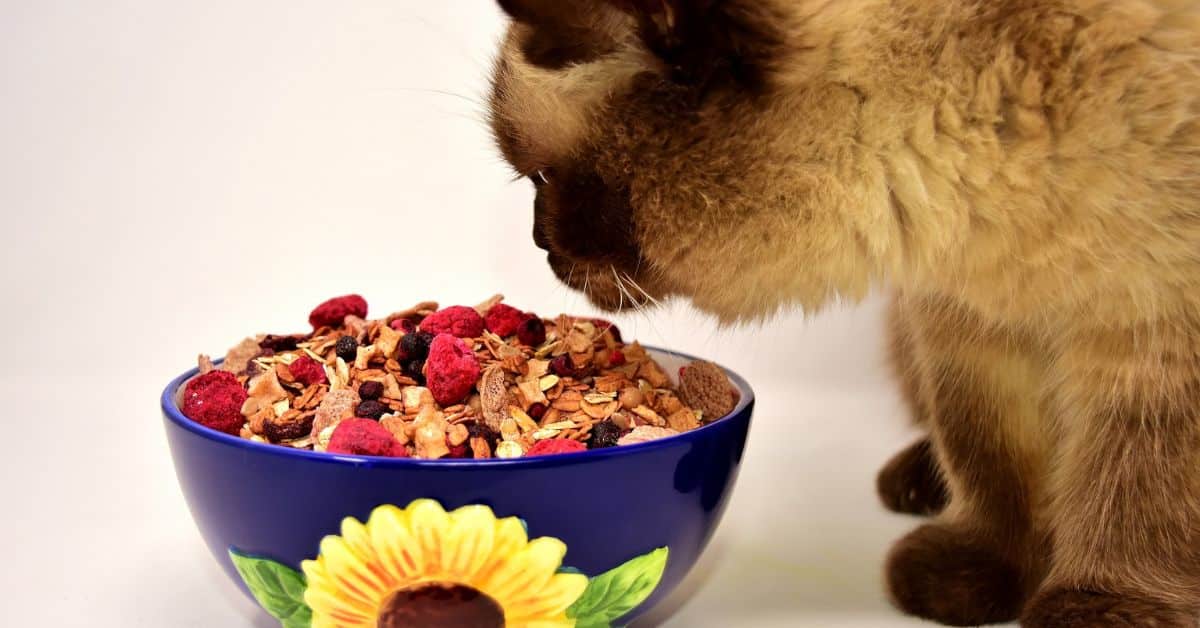
The higher fat content in cat foods can contribute to weight gain and digestive upset in dogs with sensitive stomachs. Additionally, long-term consumption of cat food can lead to nutrient imbalances and deficiencies in dogs, potentially causing liver disease or other health problems.
It’s important to provide dogs with a balanced diet of high-quality dog food tailored to their nutritional requirements and consult a veterinarian for advice on their dietary needs. Preventing access to cat food and ensuring dogs stick to their regular diet is essential for their overall health and well-being.
What to do if your dog has eaten cat food
If your dog has consumed cat food, monitor them closely for any signs of digestive upset or discomfort. Symptoms may include vomiting, diarrhea, or lethargy. Contact your veterinarian for advice on how to proceed, especially if your dog has a sensitive stomach or underlying health issues.
Depending on the amount ingested and your dog’s individual health status, your vet may recommend specific treatments or dietary adjustments. In some cases, your vet may advise you to feed your dog a bland diet or withhold food temporarily to allow their stomach to settle.
It’s essential to ensure your dog has access to fresh water and to monitor their behavior closely. Prevent future incidents by keeping cat food out of your dog’s reach and feeding your pets separately to avoid accidental ingestion. Always prioritize your dog’s health and well-being, seeking veterinary advice whenever necessary.
How to Keep Your Dog from Eating Cat Food
protect your pets’ food bowls apart and assign each one a specific spot to eat to protect your dog from getting to the cat food. To prevent access, either raise the cat’s feeding bowl or utilize pet fences. Feed your pets regularly and try not to leave food out for too long.
Invest in a premium dog food that will satisfy your dog’s nutritional needs and keep him from being tempted to look for cat food. During mealtimes, keep an eye on your pets and take out any food that hasn’t been consumed to deter scavenging. To engage your dog’s mind and divert them from looking for cat food, use interactive feeders or puzzle toys.
Additionally, provide plenty of chew toys and treats to keep your dog occupied and satisfied. By implementing these strategies, you can effectively prevent your dog from eating cat food and ensure they maintain a balanced diet for optimal health and well-being.
What is the difference between cat and dog food?
The primary difference lies in their nutritional composition tailored to meet the specific dietary requirements of each species. Cat food is formulated with higher levels of protein, essential amino acids like taurine, and certain vitamins and minerals necessary for feline health.
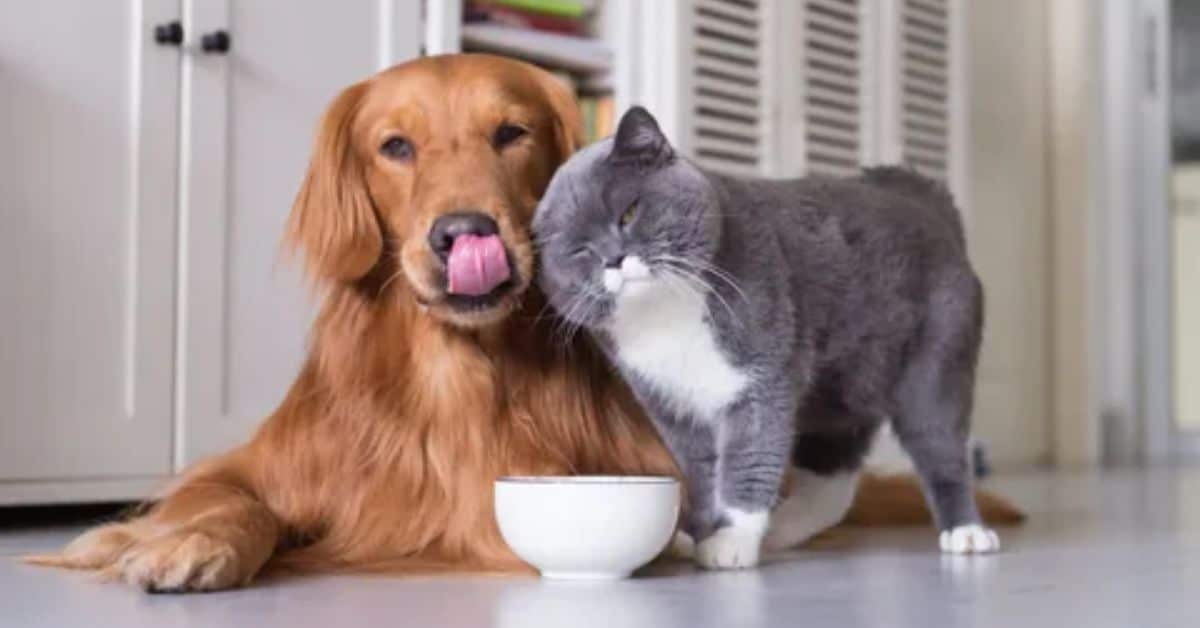
On the other hand, dog food contains nutrients suited to canine physiology, including lower protein levels and different amino acid profiles. Additionally, cat food often has a higher fat content to meet the energy needs of cats, while dog food may contain more carbohydrates for sustained energy levels.
Furthermore, cat food may come in different textures such as wet food or kibble, whereas dog food may offer a wider variety of flavors and formulations to accommodate different preferences. Understanding these differences is crucial to providing both cats and dogs with a balanced diet that supports their overall health and well-being.
Can Dogs Eat Cat Food Long Term?
While dogs can technically eat cat food in the short term without immediate harm, it’s not advisable for long-term consumption. Cat food is formulated specifically to meet the dietary needs of cats, which differ significantly from those of dogs.
Cat food typically contains higher levels of protein and fat, along with certain nutrients like taurine and arginine, which are essential for feline health but not necessarily for dogs. Prolonged consumption of cat food by dogs can lead to nutritional imbalances, potentially causing health issues such as obesity, digestive upset, and even heart problems.
Therefore, pet owners need to prioritize feeding their dogs a balanced diet formulated for their specific nutritional requirements to ensure their long-term health and well-being. If a dog inadvertently consumes cat food, it’s generally not a cause for immediate concern, but consistent access to cat food should be prevented to avoid any potential health risks.
Can Dogs Eat Cat Food in an Emergency?
In emergencies, such as a shortage of dog food, it may be tempting to feed your dog cat food as a temporary solution. However, it’s important to understand that cat food is formulated specifically for the nutritional needs of cats, which can differ significantly from those of dogs.
While a small amount of cat food as a one-time emergency measure may not cause immediate harm to your dog, it’s not recommended as a long-term solution. Cat food typically contains higher levels of protein and fat than dog food, which can lead to digestive upset and nutritional imbalances if consumed regularly by dogs.
Additionally, cat food often contains ingredients like taurine and arginine that are essential for cats but not for dogs. Therefore, while it may be okay to offer your dog a small amount of cat food in an emergency, it’s best to prioritize finding suitable alternatives or contacting a veterinarian for guidance on how to meet your dog’s nutritional needs effectively.
Conclusion
while dogs may occasionally indulge in cat food without immediate harm, it’s essential to prevent regular consumption due to potential health risks. Cat food lacks the balanced nutrients dogs require and can lead to weight gain, digestive upset, and nutrient deficiencies. Prioritizing high-quality dog food and consulting a veterinarian for dietary advice ensures dogs maintain optimal health and well-being.
For More Information
We have a ton of information regarding what foods, from popular snacks to fruits, are healthy or harmful for your dog. You might also be interested in ”Can Dog Eat Bell Pepper“
FAQ
Do dogs eat cat food?
Even though the majority of dogs enjoy eating cat food, there’s a good reason why dogs eat dog food and cats consume cat food. If your dog snuck some of the cat’s food now and then, it probably won’t hurt him, but you shouldn’t feed it to him regularly. The food needs of dogs and cats are different.
Do cats eat meat?
Due to their obligate carnivorous nature, cats need to consume meat. It is essential to life. Dogs require a more diversified diet than only meat to meet their nutritional needs since, contrary to popular opinion, dogs are omnivores, meaning they eat both meat and vegetables. Dog food has significantly less protein derived from meat than cat food.
Can dogs eat cat treats?
Cat snacks shouldn’t be regularly consumed by dogs. Similar to cat chow, cat treats are made for cats. McCarthy suggests against using cat treats for training daily, while it might be OK on rare occasions.
Can a dog eat a Cat’s Bowl?
To prevent their dogs from being attracted to the food in the cat’s bowl, dog and cat owners are recommended to feed their pets in separate rooms. If it isn’t possible, you could consider placing cat dishes on surfaces other than floors. The Dog Food Advisor offers a FREE email-based service for dog food recall alerts.




